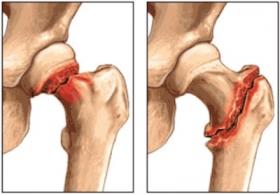
Multidisciplinary Hip Fracture Program
Multidisciplinary hip fracture care programs implemented in academic and community hospitals have shown to result in significant reduction in hospital stay and 30-day mortality, as well as lead to improved patient safety. An interprofessional team at the University of Chicago Medicine plans to use baseline information to develop means that will ultimately lead to a hip fracture pathway including standardized order sets and workflows.
- Prevent harm through reliable and innovative processes;
- Develop core capabilities to ensure readiness for shift to VBC delivery.
Target Audience
Learning Objectives
The aims for this project:
- Develop standardized order sets for admission and peri-operative care;
- Streamline peri-operative multidisciplinary care;
- Meet recommended targets for time from the ED to the OR;
- Standardize pharmacotherapy for pain control, DVT prophylaxis, delirium and other aspects of care;
- Develop standardized nursing workflows for hip fracture patients.
- 20.00 AMA PRA Category 1 Credit™
- 20.00 Participation

Click here for more information about University of Chicago Medicine!
ACCESSIBILITY The University of Chicago is committed to providing equal access appropriate to need and circumstances and complies fully with legal requirements of the Americans with Disabilities Act. If you are in need of special accommodation, please contact our office at 773-753-0582 or via email at [email protected].
Project Sponsors
Lowell T. Coggeshall Professor of Orthopaedic Surgery
Chairman, Department of Orthopaedic Surgery and Rehabilitation Medicine
Associate Professor of Orthopaedic Surgery
Progect Team Leads
Department of Orthopaedic Surgery
University of Chicago Medicine
Department of Orthopaedic Surgery
University of Chicago Medicine
Department of Orthopaedic Surgery
University of Chicago Medicine
QIPI Lead
Center for Quality
University of Chicago Medicine
Disclosure Declarations
As a provider accredited by the ACCME, The University of Chicago Pritzker School of Medicine asks everyone who is in a position to control the content of an education activity to disclose all relevant financial relationships with any commercial interest. This includes any entity producing, marketing, re-selling, or distributing health care goods or services consumed by or used on patients. The ACCME defines “relevant financial relationships” as financial relationships in any amount occurring within the past 12 months, including financial relationships of a spouse or life partner that could create a conflict of interest. Mechanisms are in place to identify and resolve any potential conflict of interest prior to the start of the activity.
Additionally, The University of Chicago Pritzker School of Medicine requires authors to identify investigational products or off-label uses of products regulated by the US Food and Drug Administration, at first mention and where appropriate in the content.
The University of Chicago Pritzker School of Medicine is accredited by the Accreditation Council for Continuing Medical Education to provide continuing medical education for physicians.
The University of Chicago Pritzker School of Medicine designates this PI CME activity for a maximum of 20 AMA PRA Category 1 Credits™. Physicians should claim only the credit commensurate with the extent of their participation in the activity.
Sustained QI Cycles: Physicians are required to complete not less than 2 intervention cycles and not less than 3 data collection points:
1st QI cycle
Baseline data collection, analysis/review, identify underlying cause(s)
Intervention(s) to address underlying cause(s)
Post-intervention data collection, analysis/review, identify remaining underlying cause(s)
Post-intervention data collection, analysis/review, identify underlying cause(s) (same as above)
Adjustment(s) / second intervention(s) to address underlying cause(s)
Post-adjustment data collection, analysis/review, identify remaining underlying cause(s)
Attestation forms must be submitted by November 30th in order for us to report credit to your ABMS specialty board and have your credit count for that year.
Claiming Credit: Enter the access code to unlock the credit claiming process.

 Facebook
Facebook X
X LinkedIn
LinkedIn Forward
Forward